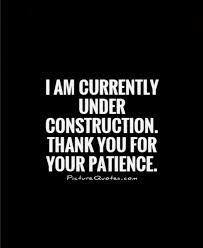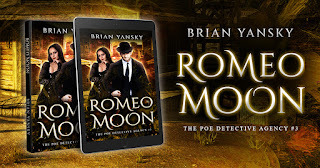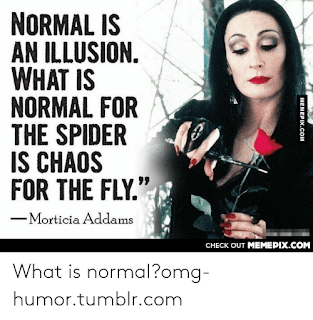Brian Yansky's Blog, page 9
October 1, 2021
What do you start with? Character, plot, setting?
For me the three main legs of a novel are character, story and language. Often , since I write speculative fiction, I'd add a fourth: setting. This can still be true for other types of fiction, too, but most true for fiction that uses world-building.
Some people start with a character. A character comes to them when they're out on a walk or in the shower and they want to write a story using that character. Some people start with plot. They have an idea for a story. Some do start with a setting and that setting is where their kernel for a novel comes from (1984 maybe). Consider To Kill A Mockingbird. I've never talked this over with Harper Lee but I can imagine her starting with a character (a young girl in a small town with a unique voice) or a plot (a story about a black man falsely accused of rape in a small, racist town) or setting (a small town that has many good people and good qualities but is racist and a situation exposes that and creates a tragedy).
When you're trying to get started, start with whatever kernel comes to you. NOW FOR THE IMPORTANT PART: you need to recognize that whatever you start with you will need the other elements to develop your story. If you start with an interesting character you need to be aware that he needs a story that will develop him in an interesting way and give him a sense of progress toward some goal or toward getting what he needs. If you have a plot that's about a journey or surviving an event you need the right characters for the specific journey. A girl from Kansas going to the OZ worked out pretty well for that particular story.
You have to do the work on this. You have to be aware that if you just try to write a character sketch your novel will likely die. If you have a plot but your characters are stick figures you move to make your plot work, your novel will not be read. Readers want characters they can identify with and care about. They won't keep reading if they don't have that.
My advice, fellow writers, pay attention to these aspects of fiction. Make them work together from the start and keep trying, as you move through your manuscript, to develop them. Your work will improve
Or so I think today.
September 20, 2021
How to Write a Novel: Part 1: How to get started
There are three secrets to writing a novel. Unfortunately nobody knows what they are.” ― W. Somerset Maugham
[image error]Martial Art of Writing
Similarities to martial arts and writing: both require skills and art. Training is similar.
Break-down movements to understand what you’re trying to do. Then practice. Then put movements together. Then practice. Repetition will build muscle memory. Same in writing. You will learn habits (through reading a lot and writing a lot) that will help you write without thinking about how you’re doing what you’re doing.
You have to get to a place where you are writing without thinking about writing. You’re just trying to live within the scene. You’ll have revision to be more analytical.
YOU NEED BOTH
TELL A STORY/ USE LANGUAGE WELL. Be a story teller and a good writer and you’ll write novels and stories people want to read. These do work together, of course, but you need to understand that the skills come from different places in your mind. You have to see with different eyes.(Need specifics for this to be clear but step 1 is realizing these two essential skills come from different places)
Language—tone, pacing, dialogue, character building, especially through dialogue.
Story: plot, structure: various layers of plot and structure. These can be sentence level sometimes but are definitely: scene, chapter, complete novel. Character development as linked to story
Theme is important: you need to figure out what you’re writing about but it’s not something you have to know right away.
And also
Language and story are partners.
Language usage can create emotions by the choice of words and by creating word images (like the camera does in film) for the reader. They see what’s happening and become involved with it. Characters become real.
Story-plot and structure-hacks the mind of the reader to pull them along with action that keeps them turning the page but also involves them in the bigger story that makes for a satisfying read. Your reader needs to have a strong narrative and feel a sense of progression toward the end.
Excellent short short example https://www.youtube.com/watch?v=9iFWyihDvCE
Why is this short-short good?
Boy kicks dog...conflict established...
Audience sympathetic for puppy—engaged because of this sympathy and how the boy is treating him.
The puppy keeps trying in DIFFERENT ways. The boy keeps resisting. Engages the reader with a question. Will the boy give in?
We’re still pissed and irritated by boy (I’m a dog lover)
BUT we want the boy to be won over by the puppy. We want it for the puppy but we also sort of want it for the boy, hope that it might make him less of a punk.
Then we see the boy. The twist/surprise/changes the story that makes us see everything we’ve already seen in a different way.
As the British says, Brilliant.
ALAS, FIRST DRAFTS SUCK. BE READY FOR IT. I ADVISE, LOW EXPECTATIONS. Keep writing your way through good and bad days.
https://www.youtube.com/watch?v=5mVZtujY2G0
Failing—being willing to fail—is essential to whatever success you eventually come to with your work
PROCESS (FOR ME) BEGINNING
Character in a situation...and the situation must have potential for CONFLICT
A boy and a girl from warring families fall in love. (this may have been done once or twice)
A boy’s father dies and he suspects it’s murder— worse that his uncle is involved and maybe his mother.
A girl wakesonashipthatseemstobeonthesea but realizes that she is dead. (Zevin, Elsewhere)
TO OUTLINE OR NOT TO OUTLINE: Are you a discovery writer or an outliner or a little of both? Most people are probably a little of both.
John Irving is the ultimate outliner. Brandon Sanderson is also a big outliner. Stephen King is a discovery writer. There is no one way to work. You have to find out what works for you. Experiment.
A character in a situation is how I usually begin. This may include a setting idea along with story. This will get you started but you need more to keep going. If all I have is a cool situation, it’s hard to move past the opening.
I do one page of outlining to have a very general idea of what might happen in the novel. At least this way I can move beyond just the first twenty/ thirty pages.
Then I do a POINTS ON THE MAP—four or five points—from beginning to end that will help me move from point to point. Next step, I’ll try one sentence summary of some scenes in-between the points. All of the above will change in revision
I do outlining as I go along.
Sometimes I will try to just write what I want to do in a scene and write some dialogue as a way to get started on a difficult scene
I try to follow my own advice and keep writing and not let myself be stopped by the messy and ugly first draft.
Exercise
Do an outline-–a points on a map outline for a story you’re working on (at least five points). Or if you don’t have a story, do an outline for one of the following:
A girl volunteering in an assisted living community notices that people die when they’re befriended by one of the women who lives there.
A policeman owns ten cats and comes home one night and they’re all gone.
A boy and his girlfriend (who cheated on him) meet at a party.
A father and his son, who have never gotten along, have to learn to live together after the boy’s mother/father’s wife dies. One scene that shows them trying to cope together—maybe after the funeral.
A boy suddenly realizes he has some kind of supernatural ability. Maybe he can read minds. He talks to his parents about it. They reveal a secret.
September 8, 2021
I like dogs and I have a lot of dogs in the Poe Detectiv...
I like dogs and I have a lot of dogs in the Poe Detective Agency novels. I made a little book of them, seventeen pages with pictures and descriptions, for my email list. Sign up if you're interested. Here's a sample—Charlie, Boss Dog, and Hamlet.



Writing tip of the day: Write what you care about. Find something to care about—small things, big things, tiny things, gigantic things—and you will be fine. You will be happy even if the story doesn't sell (and it is more likely to sell if you can communicate your love or disgust or joy or even, alas, your hate) because you care about the story and probably will have fun writing it.
September 3, 2021
As a writer and as a person I feel like I am constantly ...
As a writer and as a person I feel like I am constantly taking this sign down and putting it back up.

Maybe it's not such a bad thing though. You got to have hope.
Here is my newest hope, the third novel of the Poe Detective Series, Romeo Moon.

It's a fantasy, second-world, historical (set around 1915 except, you know, second world, so the bad guy is an evil magician), western, with attention to language and humor. In other words, a mutt. I write mutts.
I do think that readers are more receptive to genre bending and blending than they once were. Why is that? More reviewers from more diverse spaces? Maybe because the big five or four or three or whatever it is this week don't have the strangle hold they once did on the market? Whatever the reason, I'm glad for it.
Thanks for reading. Brian
September 1, 2021
Here is today's brief lesson in writing fiction. You have...

Here is today's brief lesson in writing fiction. You have to know your character. Do your best, your very best, to not force your character to do and say things that they would not do or say just because you think your plot needs them to. Do not give into the common problem of manipulating your characters to further your plot. BE TRUE TO YOUR CHARACTERS, Writers. Get into the mind of your spiders and your flies. That's where the magic is. Forcing your characters into false, illogical, manipulated actions and thoughts and conversations and so on will wake your reader from their fictional dream and they will be pissed and put down your book and maybe throw your book across the room and break a glass (oops, autobiography sneaking in). Let the spider be the spider and the fly the fly.
Thanks for reading.
July 31, 2021
I'm sitting in front of my computer, ready to write and ...
I'm sitting in front of my computer, ready to write and I'm writing a story which I really love and think is going quite well and that damn little voice in my head starts in. This is crap. You don't really want to work on this now. It's so quiet. Why doesn't the world out there make some noise?
How about some music?
It's the silence. I feel alone when I write. The characters are not engaging me today, not making me feel that rush of life I'm making on the page because I'm not making it well. Not today. Maybe I should take off today.
NO.
I'm hungry. The dog is asleep on the floor five feet from me but I look at him (is he actually snoring? should dogs snore?) and I know he wants to go for a walk. The poor dog needs a walk that's obvious. Or maybe he needs to be taken to the vet because should dogs snore?
Anyway, the truth is I'm very hungry. Maybe I should go out for breakfast, come back, start late today.
Anyway, this manuscript I thought was so good, working so well, this morning is crap. What was I thinking?
Why write anyway? It's too hard and too lonely.
The words on that page are not bringing a story and characters to life. They're sinking ships. They're a graveyard of wrong words and failed attempts.
I need to take a little time off and evaluate. Maybe I need to work on characterization. I could write up some sketches.
I could turn on the TV, check my email, check my phone.
You know how this goes? Time passes, I lose focus, I get angry with myself or disappointed or both, and no words or few words and not my best words get to the computer page because THE VOICE is stopping me.
I don't have a solution. All I have is this: I know that voice. I know it's there and I know what it's trying to do. And I know it's me that is that voice, and I know I have to silence it and the noise it creates to get back to doing what I love. The only way I know how to do that is to go back to the page and write and after some struggle, eventually, the voice will be drowned out by the words on the page and I will fill the silence with my words.
That voice is me and I'm the only one who can silence it and I can only silence it by doing.
July 13, 2021
Kindle Vella is a new serialized story site on Amazon. It...
Kindle Vella is a new serialized story site on Amazon. It just launched today. If you write novellas or you have a collection of stories and you're having a hard time finding a place for them you might take a look at Kindle Vella. Here's a place where you can get more information. https://www.kdpcommunity.com/s/?language=en_US
Here are two stories I'm currently running there. One is a Scifi Suspense story that begins with it snowing in July in Texas. Another is an urban fantasy in which a detective (upholder of the law) is in love and in fact engaged to a villain (breaker of the law). What could go wrong? First three episodes are free. Check them out.
Brian
June 22, 2021
HOW TO WRITE A NOVEL: Use both sides of your brain
Somerset Maugham once said, according to some sources, “There are three rules for the writing of novels.Unfortunately, nobody knows what they are.” He was playing to our desire for learning the secret ingredients we're sure the best writers and bestselling writers have found. He was also following his claim with the reality of our situation: there are no three rules that we can follow even if we follow them.
Just so we're clear. I've got no rules to give you but I do have an approach that works for me and that I've developed over time and that might just work for you. It's simple. That is it has a simple version.
Use both sides of your brain.
One side you should use for story, plot, character at the plot level (interaction of character and story), setting, and pacing. This side tells a good story.
On the other side: this side should be used for language—making sentences that use language in a way that pulls the reader into your story. Create powerful descriptions and detail that comes from seeing scenes as a camera might see them. Creating real characters that readers believe in. Finding just the right tone for the story. The use of dialogue for both plot and character development. This side is about using language in such a way that the story emotionally engages the reader or engages him/her in other ways: makes the reader laugh, think, whatever.
The two sides overlap, of course, but here's the kicker: You need to use them separately. You need to be able to create a good story AND use language as a way of connecting with your reader and giving depth to your story but you can't do them at the same time or at least not at first. You need to think of them separately until you can use them together without thinking. Even then I'd say you need, in revision, to isolate and work on both sides since both are essential to writing fiction.
April 18, 2021
Fiction—Outline Haters, Try This
I was a total discovery writer when I began writing and since then have moved toward more pre-drafting preparation in my process. RR Martin says that writers are gardeners (discovery writers) or architects ( outliners) in their approach to the process of writers.
But there is a continuum and many (most) writers will be a bit of both. I think of myself as a bit of both but recently I’ve learned things go better for me if I plan more before I start writing.
Here’s a tip: One kind of outlining in called points-on-a-map. It means that you start with four or five or ten points that you work out you will have in your novel. The last point will be your ending. Then you fill in the places in-between with whatever helps you get between each point. I’ve done a very limited version of this in the past. Maybe three or four sort of vague points.
NOW I do more.
Here’s what I advise. If you just think of your outline as made up of points you’re going to work through it makes the process a bit stagnant and inconsequential.
What I do now is try to think of these points as points I really want to get to. Imagine you come up with five places you really want to see on your trip across America. Maybe there’s something you want to do at some of these places or someone you want to visit or something you want to experience in some unique way.
In other words make the points places you really want to get to.
Make your main points exciting and important to your story and it will help you with the filling in part. Just taking this approach, seeing the outline from this angle, can help you come up with interesting points of plot as you work through your outline and manuscript.
April 6, 2021
Use language as the camera
I’ve heard this before from many writers but I heard it most recently from Joyce Carol Oates and the way she expressed it—and also the fact that I think her writing is often very introspective and rich as one of those buttery voiced singers—made me start thinking about how creating a picture with words for the set design of a scene is actually really important: not just for descriptive particulars but also for choosing details of a character and of what happens in the scene. It can also help with showing more and telling less.
SO here’s what she said—paraphrase—
the writer should see the scene she is writing as if she’s off to the side and has a camera. But the camera is language. Use your camera to describe what’s happening.
For me doing this has made me think more and express more about how characters move and what the place they’re moving in looks like and feels like. It also has led to my finding what they’re thinking and feeling more accurately in that moment. Use it to ground your camera, but think of it as being made of language, and show the reader you scene.



